- Home
- Anna Kavan
Machines in the Head Page 2
Machines in the Head Read online
Page 2
In all the narrative about Kavan’s life, little has been said about her politics, but political she most certainly was in her singular way. Her journalism, published in Horizon during the years 1943–6 demonstrates this plainly. The left–right political spectrum cannot accommodate her views any more than her fiction fits into conventional categories of literature; she was pacifist, nihilist, atheist, vehemently anti-fascist but without revolutionary vision – in fact, she rejected organized politics entirely and believed that collective society was inevitably totalitarian. Her ideals can be best described as individualist anarchist. Yet she believed in our mutual responsibility towards one another, and her focus on the individual was in part attentiveness to those who are dispossessed, marginalized and alone. Her pacifism during the Second World War did not extend as far as Ian Hamilton’s, for she did not refuse to participate in war work, but she rejected any notion of heroism or glory, believing all parties to be guilty of terrible atrocities. Her conviction that human beings were hell-bent on their own destruction, and that of the natural world around them, is clearly evident in her writing during and after the war.
Kavan’s life was not cut tragically short. She was sixty-eight when she died, and she had lived with various health problems, exacerbated by her heroin use, for much of her adult life. Her ashes were interred in her beloved garden in west London. It was only after her death that the mythology that has come to surround Anna Kavan began to accumulate, and she became, once again, a fiction. Tales of her heroin addiction, difficult temperament and enigmatic nature began to circulate in biographical pieces promoting her posthumous collections Julia and the Bazooka (1970) and My Soul in China (1975). She appeared as ‘Karen’ in a novel based on her marriage to Stuart Edmonds and, more recently, in a play about her friendship with Rhys Davies and in a French novel, Anna K.2 With no living relatives and limited archival sources, her characters’ fictional experiences have been appropriated to enhance the known facts of her life. But if, as she believed, the truth of life can be found in fiction, it is fitting that her reality and her fantasy have become indistinguishable in the story of Anna Kavan.
VICTORIA WALKER
2019
1. Letter to Peter Owen, 29 March 1966, Harry Ransom Center, Austin, Texas.
2. Rhys Davies’s novel Honeysuckle Girl (London: Heinemann, 1975) was based on Kavan’s marriage to Stuart Edmonds; D. J. Britton’s play Silverglass (first performed at Swansea University, 13 September 2013) represents Kavan’s friendship with Rhys Davies; Catherine LeNoble published a novel in French, Anna K (Orléans: Editions HYX, 2016).
MACHINES IN THE HEAD
GOING UP IN THE WORLD
IN THE LOW-LYING streets near the river where I live there is fog all through the winter. When I go to bed at night it is so cold that the pillow freezes my cheek. For a long time I have been lonely, cold and miserable. It is months since I have seen the sun. Suddenly, one morning, all this becomes intolerable to me. It seems that I can no longer bear the cold, the loneliness, the eternal fog – no, not even for another hour – and I decide to visit my Patrons and ask them to help me. It is a desperate resolve, but once I have made it I am filled with optimism. Perhaps I deliberately trick myself with false hopes as I put on my best dress and carefully make up my face.
At the last moment, just as I am ready to start, I remember that I ought to take a present with me. I have no money with which to buy a gift worthy of such great people: is there anything in the house that will do? In a panic I hurry from room to room, as if expecting to discover some valuable object, the existence of which I have overlooked all the time I’ve been living here. Of course there is nothing suitable. Some apples on the kitchen shelf catch my eye because even in this gloomy half-light their cheeks show up yellow and red. I hastily fetch a cloth and polish four of the yellowest apples until they shine. Then I line a small basket with fresh paper, arrange the apples inside and set out. On my way I tell myself that the simple fruit may please palates which have grown too accustomed to the flavour of hot-house peaches and grapes.
Soon I am in a lift, being whirled up towards the skies. A man-servant in white stockings and purple knee-breeches shows me into a magnificent room. Here one is above the fog, the sun is shining outside the windows draped in soft veils of net, or, if it is not, it makes no difference, for the room is full of artificial sunshine from the concealed lights. The floor is covered by a carpet softer than moss, there are chairs and great sofas upholstered in delicate brocade, beautiful flowers are arranged in vases, some of which are shaped like shells and some like antique urns.
My Patrons are not present, and I am in no hurry to meet them. I am happy just to be in this warm room with its sunny, flower-scented air through which one almost expects to see butterflies flitting. After the foggy gloom to which I have grown accustomed it is like being transported to summer, to paradise.
Before very long my Patron appears. He is tall and fine-looking as such an important man ought to be. Everything about his appearance is perfect: his shoes gleam like chestnuts, his shirt is of finest silk, he wears a red carnation in his buttonhole and in his breast pocket is a handkerchief bearing a monogram embroidered by holy women. He greets me with charming courtesy, and we sit talking for a while on general topics. He addresses me as an equal. I begin to feel quite elated at such a promising start. Surely everything is going to turn out as I wish.
The door opens and my Patroness enters. We both rise to meet her. She is dressed in deep-blue velvet, and on her hat perches a small bird as vivid and rare as a jewel. There are pearls around her neck and diamonds on her smooth hands. She speaks to me with rather stilted brightness, smiling with narrow lips that do not unclose easily. Diffidently I offer my humble present, which is graciously accepted and then laid aside. My spirits fall somewhat. We sit down again in our cushioned seats and for a few minutes continue to maintain polite conversation. There comes a pause. I realize that the preliminaries are over and that it is time for me to state the object of my visit.
‘I am freezing with cold and loneliness down there in the fog!’ I exclaim in a voice that stammers with its own urgency. ‘Please be kind to me. Let me share a little of your sunshine and warmth. I won’t be any trouble to you.’
My companions glance at one another. A look of the deepest significance passes between them. I do not understand what the look means, but it makes me uneasy. It seems that they have already considered my petition and come to an understanding about it between themselves.
My Patron leans back in his chair and places the tips of his long fingers together. His cufflinks glitter; his hair shines like silk.
‘We must treat this question objectively,’ he begins. His voice has a reasonable, impartial sound, and I start to feel hopeful again. But as he goes on talking I perceive that the air of consideration which has impressed me so favourably is really nothing but a part of his perfect ensemble and no more to be relied upon than the flower in his buttonhole. In fact, he is not to be trusted.
‘Don’t think that I am accusing you,’ he says, ‘or setting myself up as your judge, but you must admit that your conduct towards us in the past has been far from satisfactory.’
He looks again at my Patroness who nods her head. The little bird in her hat seems to wink at me with its brilliant blind eyes.
‘Yes,’ says she, ‘you have caused us a great deal of sorrow and anxiety by your bad behaviour. You have never consulted our wishes about anything but have obstinately gone your own way. It is only when you are in trouble that you come here asking us to look after you.’
‘But you don’t understand,’ I cry, and I am ashamed to feel tears in my eyes. ‘It’s a matter of life and death this time. Please don’t bring the past up against me now; I’m sorry if I’ve offended you; but you have everything, and you can afford to be generous. It can’t mean very much to you. But, oh, if only you knew how I long to live in the sunshine again! ’
My heart falls into my boots while I am
speaking. I am plunged into despair because I see that neither of my hearers is capable of comprehending my appeal. I doubt if they are even listening to me. They do not know what fog is like; it is only a word to them. They do not know what it means to be sad and alone in a cold room where the sun never shines.
‘We don’t intend to be hard on you,’ my Patron remarks, crossing his knees. ‘No one will ever be able to say that we have not treated you with patience and forbearance. We will do our best to forget and forgive. But you, on your side, must promise to turn over a new leaf, to make a clean break with the past and give up your rebellious ways.’
His voice goes on, but now I am the one who is not listening. I have heard enough to fill me with hopeless disappointment. It is useless for me to attempt any further approach to people who are utterly inaccessible, utterly out of sympathy with me. Almost at my last gasp, I come to throw myself on their mercy, and a lecture is all they can find for me in their empty hearts. I sigh and undo my coat, which no one has invited me to remove and in which I am now uncomfortably warm. My eyes glance sadly about the handsome room, in the golden, flowery atmosphere of which butterflies might be floating. Through a glaze of tears I catch sight of my yellow apples pushed into a corner behind an enormous box of liqueur chocolates. I feel remorseful because I have brought them here only to be abandoned to indignity. Perhaps the valet or the chambermaid will take a bite out of one of them before they are thrown into the dustbin.
‘You must set out with the fixed intention of doing your duty towards us,’ my Patron is saying. ‘You must try your hardest to wipe out past bad impressions. Above all you must demonstrate your gratitude towards your Patroness, earn her forgiveness and prove yourself worthy of her generosity.’
‘And where am I to find a little warmth in all this?’ I cry out desperately. What an incongruous sound the words have between these serene walls and how the fastidious flowers seem to toss their heads in disdain.
I know now that I have thrown away my last chance. There is no object in waiting a moment longer, so I get up and fly from the room. And at once the lift is swooping away with me, carrying me down to the cold, foggy streets where I belong.
THE ENEMY
SOMEWHERE IN THE WORLD I have an implacable enemy, although I do not know his name. I do not know what he looks like, either. In fact, if he were to walk into the room at this moment, while I am writing, I shouldn’t be any the wiser. For a long time I believed that some instinct would warn me if we ever came face to face, but now I no longer think this is so. Perhaps he is a stranger to me; but much more probably he is someone whom I know quite well – perhaps some one I see every day. For if he is not a person in my immediate environment how does he come to possess such detailed information about my movements? It seems quite impossible for me to make any decision – even concerning such a trifling matter as visiting a friend for the evening – without my enemy knowing about it and taking steps to ensure my discomfiture. And, of course, as regards more important issues, he is just as well informed.
The fact that I know absolutely nothing about him makes life intolerable, for I am obliged to look upon everybody with equal suspicion. There is literally not a soul whom I can trust.
As the days go past I find that I am becoming more and more preoccupied with this wretched problem; indeed, it has become an obsession with me. Whenever I speak to anyone I catch myself scrutinizing him with secret attention, searching for some sign that would betray the traitor who is determined to ruin me. I cannot concentrate on my work because I am always debating in my mind the question of my enemy’s identity and the cause of his hate. What act of mine can possibly have given rise to such a relentless persecution? I go over and over my past life without finding any clue. But perhaps the situation has arisen through no fault of my own but merely on account of some fortuitous circumstances that I know nothing about. Perhaps I am the victim of some mysterious political, religious or financial machination – some vast and shadowy plot, whose ramifications are so obscure as to appear to the uninitiated to be quite outside reason, requiring, for instance, something as apparently senseless as the destruction of everybody with red hair or with a mole on his left leg.
Because of this persecution my private life is already practically in ruins. My friends and family are alienated, my creative work is at a standstill, my manner has become nervous, gloomy and irritable, I am unsure of myself, even my voice has grown hesitating and indistinct.
You would think that my enemy might take pity on me now; that, seeing the miserable plight to which he has reduced me, he would be content with his vengeance and leave me in peace. But, no, I know perfectly well that he will never relent. He will never be satisfied until he has destroyed me utterly. It is the beginning of the end now, for during the last few weeks I have received almost certain indications that he is starting to lodge false accusations against me in official quarters. The time can’t be far off when I shall be taken away. It will be at night, probably, that they will come for me. There will be no revolvers, no handcuffs; everything will be quiet and orderly with two or three men in uniform or white jackets, and one of them will carry a hypodermic syringe. That is how it will be with me. I know that I’m doomed, and I’m not going to struggle against my fate. I am only writing this down so that when you do not see me any more you will know that my enemy has finally triumphed.
AIRING A GRIEVANCE
YESTERDAY I WENT TO see my official adviser. I have visited him fairly often during the last three months in spite of the inconvenience and expense of these interviews. When one’s affairs are in such a desperate state as mine, one is simply obliged to make use of any possible help, and this man D has been my last hope. He has been the only source of advice and assistance available to me, the only person with whom I could discuss my affairs: in fact, the only person to whom I could speak openly about the intolerable situation in which I have been placed. With everybody else I have had to be reserved and suspicious, remembering the motto ‘Silence is a friend that never betrays anyone.’ For how can I tell whether the person to whom I am talking is not an enemy or perhaps connected with my accusers or with those who will ultimately decide my fate?
Even with D I have always been on my guard. From the start there have been days when something seemed to warn me that he was not altogether to be trusted, yet on other occasions he filled me with confidence; and what was to become of me if I were deprived even of his support – unsatisfactory as it might be? No, I really couldn’t face the future entirely alone, and so, for my own sake, I must not distrust him.
I went to him confidently enough in the first place. His name was known to me as that of a man, still young but already very near the top of his profession. I considered myself lucky to have been placed in his charge, notwithstanding the long journey which separated me from him: in those early days I did not anticipate having to visit him frequently. At the beginning I was favourably impressed by his solid town house and by the room in which he received me with its wine-coloured velvet curtains, its comfortable armchairs, its valuable-looking pieces of tapestry.
About the man himself I was not so certain. I have always believed that people of similar physical characteristics fall into corresponding mental groups, and he belonged to a type which I have constantly found unsympathetic. All the same, there could be no doubt as to his ability; he was excellently qualified to take charge of my case, and as I was only to meet him occasionally – and then in a professional and not in a social capacity – the fact of our being basically antipathetic to one another seemed of little significance. The main thing was that he should devote sufficient time to my affairs, that he should study my interests seriously, and this, to begin with, he seemed quite prepared to do.
It was only later, as things went from bad to worse and I was obliged to consult him at shorter and shorter intervals, that I started to feel dubious about his goodwill towards me.
At our early meetings he always treated me with extreme consid
eration, even with deference, listening with the closest attention to everything I had to say and in general impressing me with the grave importance of my case. Irrational as it may sound, it was this very attitude of his – originally so gratifying – which aroused my first vague suspicions. If he were really looking after my interests as thoroughly as he asserted, why was it necessary for him to behave in this almost propitiatory way which suggested either that he was trying to distract my attention from some possible negligence on his part or that matters were not progressing as favourably as he affirmed? Yet, as I have previously mentioned, he had a knack of inspiring confidence, and with a few encouraging, convincing phrases he could dispel all my tenuous doubts and fears.
But presently another cause for suspicion pricked my uneasy mind. Ever since my introduction to D, I had been aware of something dimly familiar about his face with the very black brows accentuating deep-set eyes into which I never looked long enough or directly enough to determine their colour but which I assumed to be dark brown. From time to time my thoughts idly pursued the half-remembered image which I could never quite manage to bring into full consciousness. Without ever really giving much attention to the subject, I think I finally decided that D must remind me of some portrait seen long before in a gallery, most probably somewhere abroad, for his countenance was decidedly foreign and contained the curious balance of latent sensuality and dominant intellectualism seen to the best advantage in some of the work of El Greco. Then one day, just as I was leaving his house, the complete memory which had eluded me for so long suddenly came to me with an impact sharp as a collision with a fellow pedestrian. It was no ancient portrait that D’s face recalled to my mind but a press photograph, and one that I had seen comparatively recently, one that was contained in an illustrated periodical which was probably still lying about somewhere in my living-room.

 Machines in the Head
Machines in the Head Ice
Ice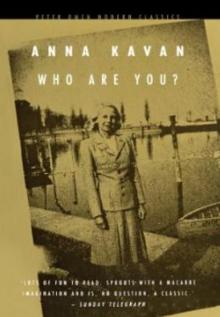 Who Are You?
Who Are You?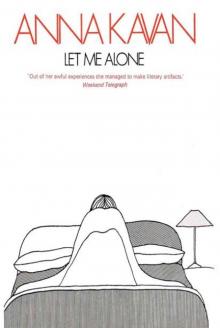 Let Me Alone
Let Me Alone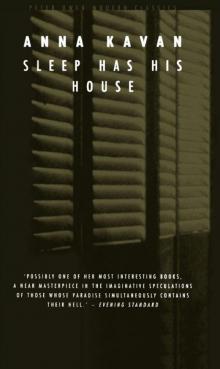 Sleep Has His House
Sleep Has His House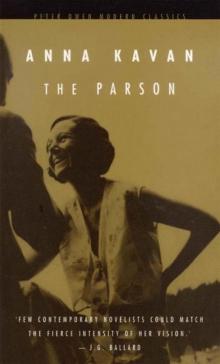 The Parson (Peter Owen Modern Classic)
The Parson (Peter Owen Modern Classic) Guilty: The Lost Classic Novel
Guilty: The Lost Classic Novel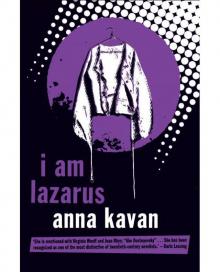 I Am Lazarus (Peter Owen Modern Classic)
I Am Lazarus (Peter Owen Modern Classic)